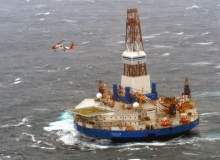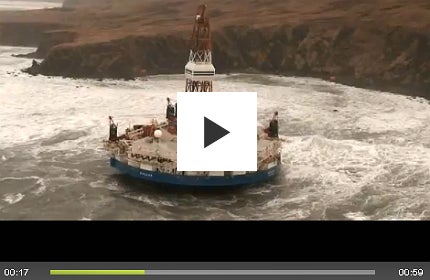
The idea of drilling the Arctic for oil, however controversial, has conjured up significant support in recent years.
According to the Arctic National Refuge, more than 75% of Alaskans, along with democratically elected congressional delegations and governors, favour exploration and production in the region, for the billions of dollars it would contribute to the US economy and the thousands of jobs it is expected to create.
The Obama administration has also supported the rush for resources in the Arctic, hoping it will reduce the US trade deficit, decrease OPEC power and improve national energy security.
But preliminary drilling by Royal Dutch Shell in the Chukchi and Beaufort Seas has led to a series of debacles during the last few months, and experts fear the company’s latest mishap may be just the tip of the iceberg.
On 2 January, one of two Arctic-class drill ships deployed by Shell ran aground in the shallow water off Sitkalidak Island after drifting in stormy weather. The Kulluk rig deviated from one of its tow lines and grounded on rocks along the south-east shoreline.
Arctic oil spill would be "disaster"
The Kulluk rig deviated from one of its tow lines and grounded on rocks
The incident followed repeated equipment failures, including damage to a piece of safety kit during testing in September 2012, prompting Shell to postpone an attempt to drill into oil-bearing rock.
These events should have come as a warning sign that drilling in the Arctic is too risky, say environmental groups, who fear an oil spill similar to the one seen in the calm waters of the Gulf of Mexico in 2010 would be near-impossible to deal with, due to the lack of available infrastructure, equipment and personnel in Alaska.
Even oil majors have warned of the dangers of Arctic drilling. Total SA chief executive Christophe de Margerie told the Financial Times in September that the risk of an oil spill in such an environmentally sensitive area was simply too high. "Oil on Greenland would be a disaster," he said in an interview. "A leak would do too much damage to the image of the company".
Shell bluntly told the Center of American Progress in August 2012 that the debate over exploratory drilling in Alaska is "over". But with a sweeping review of the company’s drilling plans about to commence following the grounding of Kulluk, and increasing pressure on the Obama administration to reconsider its decision to open up the Arctic to oil companies, Shell may be about to eat its words.
Related content
Drilling Arctic oil: do Shell’s response plans hold water?
After five years of battling with US courts, Royal Dutch Shell is now one step closer to becoming the first company to drill for oil in the Arctic since the 1990s.
Drilling the arctic: Romney vs. Obama
Barack Obama and Mitt Romney both advocate drilling in the Alaskan Arctic Ocean, but could their policies on the matter really be so similar?
Follow Sarah Blackman on Google+





